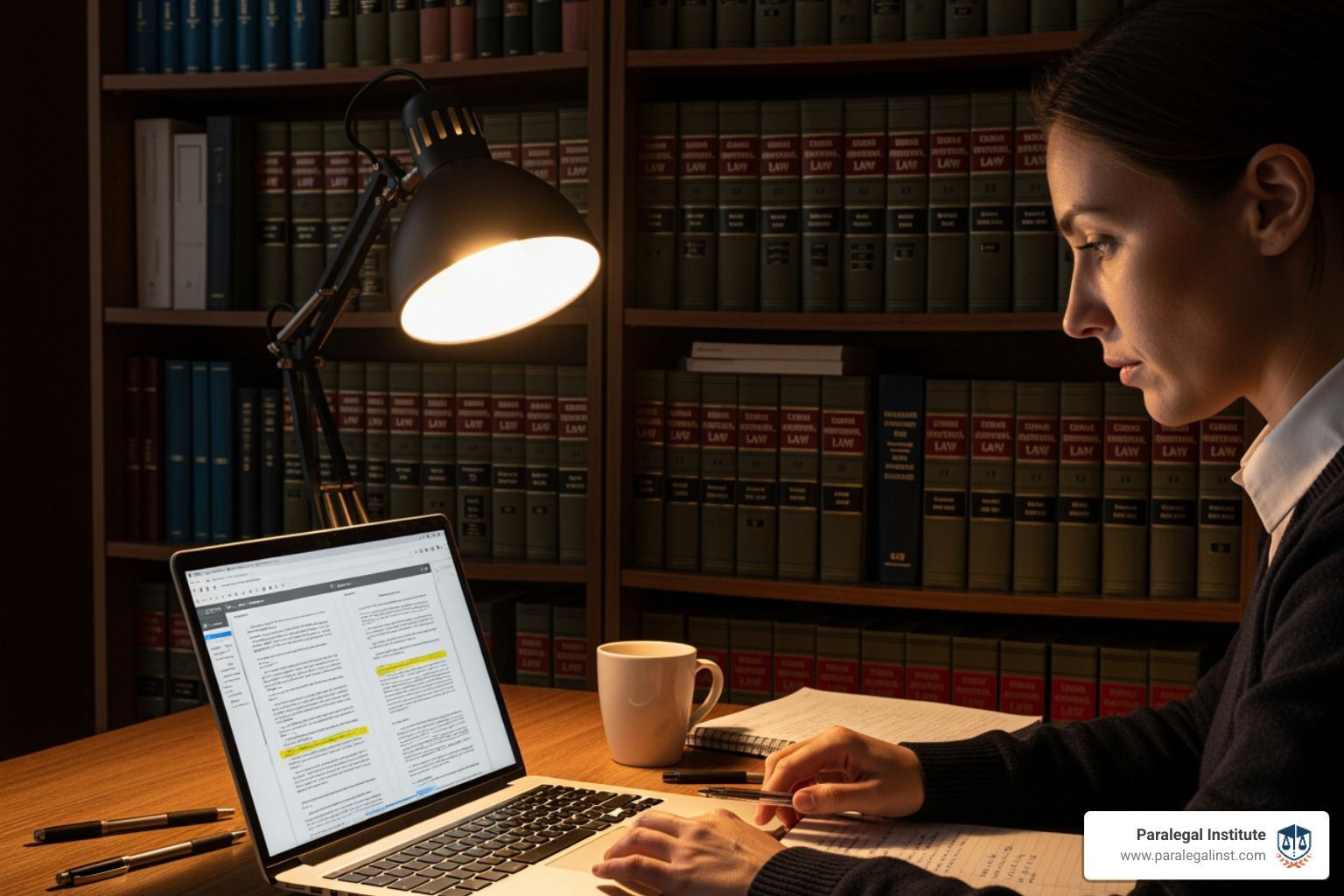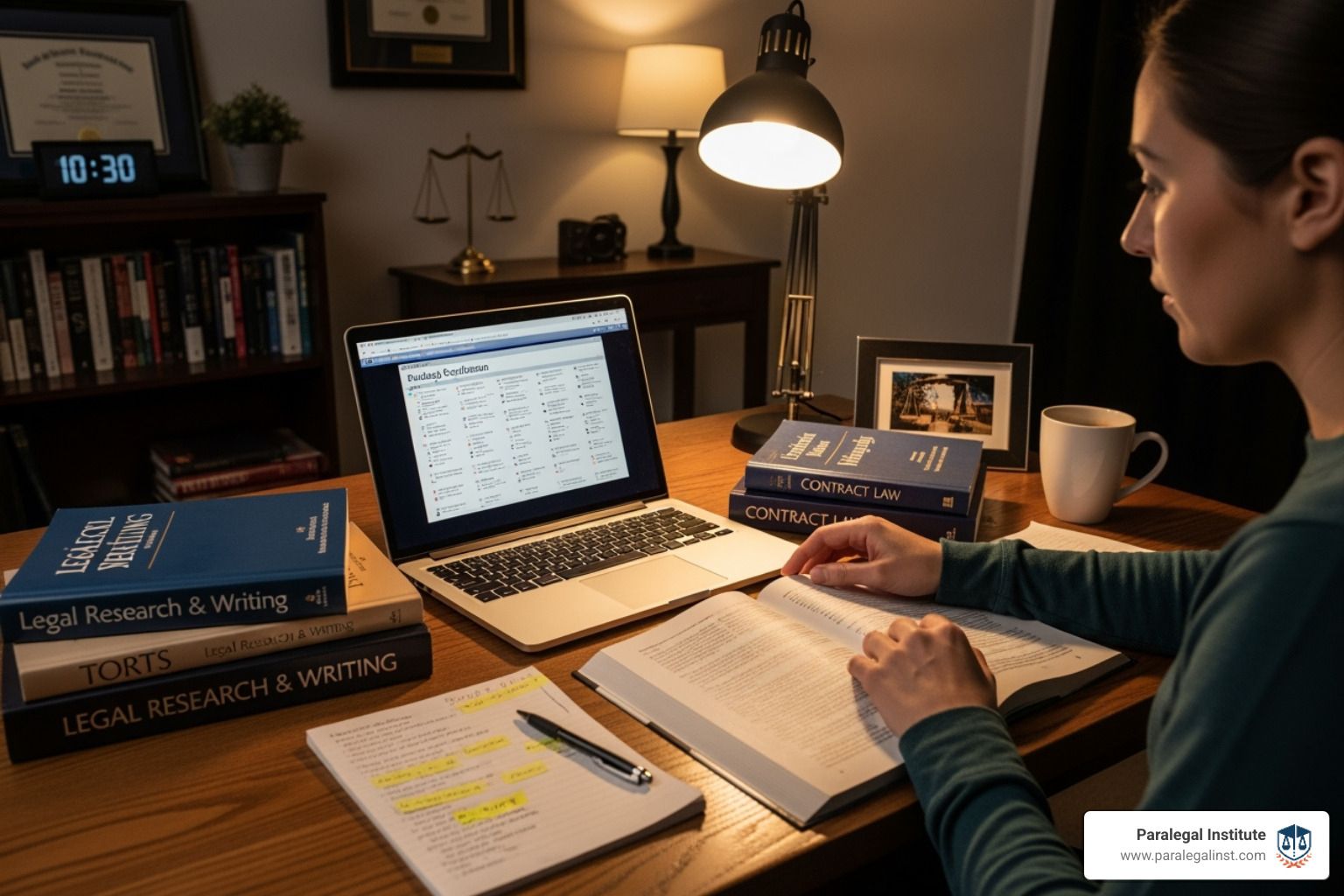Ready, Set, Practice! Paralegal Exam Questions You Need
Why Practice Questions Are Your Secret Weapon for Paralegal Success
Paralegal exam practice questions are the foundation of effective test preparation, helping you master both the 120 multiple-choice Knowledge Test and the critical thinking Skills Test required for paralegal excellence.
Quick Answer for Test-Takers:
- Knowledge Test: 120 multiple-choice questions, 3-hour time limit, covers 10 legal areas
- Skills Test: 1 written legal memorandum, 2-hour time limit, tests analysis and writing
- Total Time: 5 hours combined
- Passing Score: Not publicly disclosed, results show "pass" or "fail"
- Retake Policy: Must wait 90 days between attempts
The path to becoming a skilled paralegal starts with understanding what you'll face on test day. The paralegal exam tests your knowledge across civil litigation, contracts, criminal law, torts, ethics, and six other core areas. But knowing the law isn't enough - you need to think like a paralegal under pressure.
Practice questions reveal the exam's unique format and help you spot common traps. For example, 20 of the 120 multiple-choice questions are unscored "pre-test" items, but you won't know which ones. Every question demands your full attention.
The Skills Test presents an even bigger challenge. You'll analyze a legal scenario, spot issues, apply relevant law, and write a clear memorandum - all within two hours. Without practice, even strong students struggle with time management and organization.
I'm Matthew Pfau, and I've spent years training paralegals and hiring them for my law firm. I've seen how targeted paralegal exam practice questions can transform nervous test-takers into confident professionals ready to excel in the legal field.
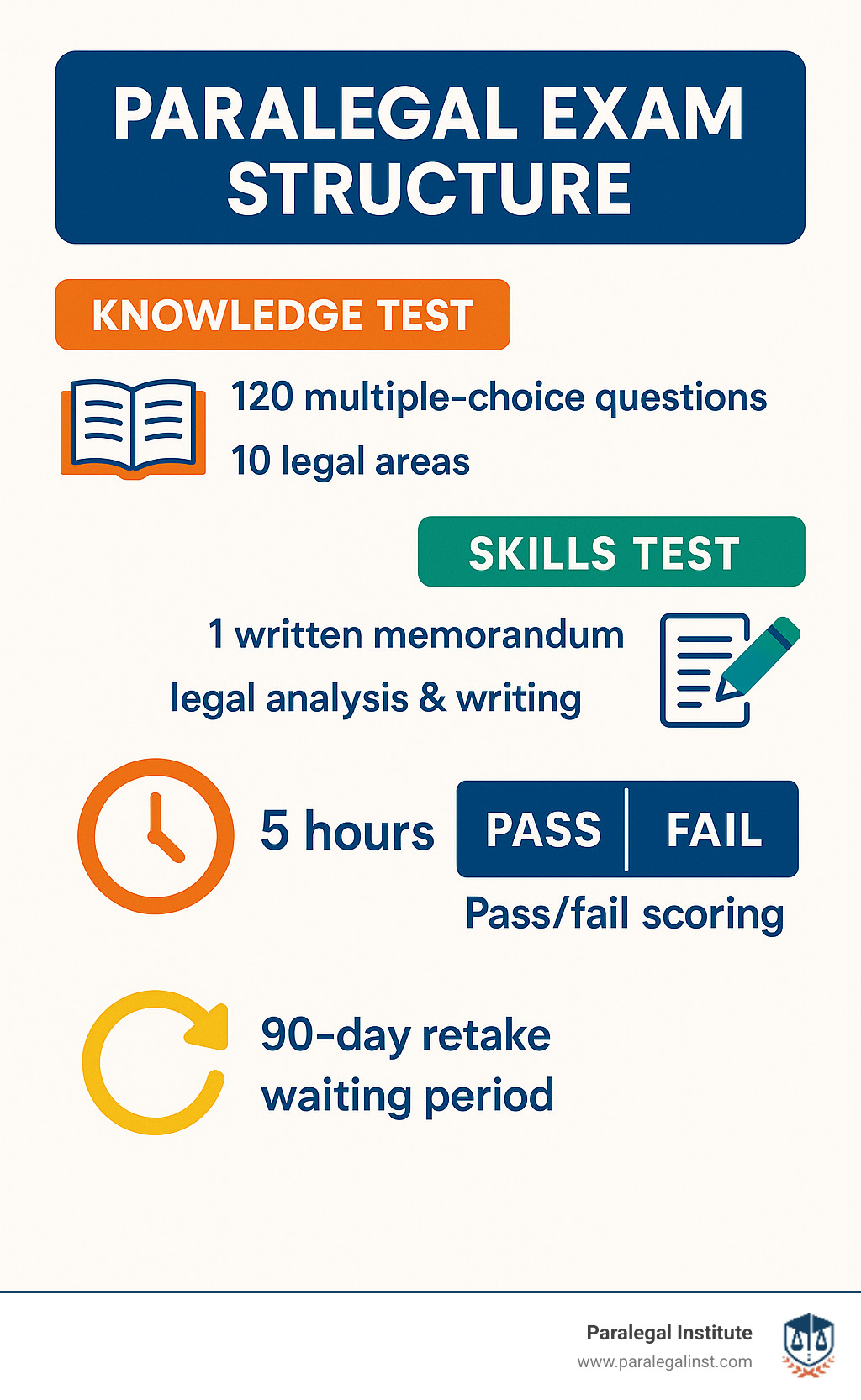
Paralegal Exam Structure at a Glance
Think of the paralegal exam like a two-act play. Act One tests what you know, Act Two tests how you think. The Knowledge Test throws 120 multiple-choice questions at you covering everything from civil litigation to ethics. The Skills Test hands you a messy legal scenario and says "fix this" - in memo form, of course.
Here's where things get interesting: only 100 of those 120 multiple-choice questions actually count toward your score. The other 20 are "pre-test" questions that the exam makers use to test future questions. You won't know which ones they are, so you can't phone it in on any question.
The scoring uses the Angoff method- basically, a panel of legal experts decides what a competent paralegal should know. Your results come back as a simple "pass" or "fail" with no number attached.
The Knowledge Test covers ten core areas that every paralegal needs to master. The US Legal System and Civil Litigation each carry 15 points- the heaviest hitters on the exam. Contracts, Corporate Law, Criminal Procedure, Estate Planning, Real Estate, and Torts each weigh in at 10 points. Ethics gets 5 points, and Bankruptcy rounds out the list with another 5 points.
The Skills Test focuses on two main areas: your legal writing ability and your critical thinking skills. Can you spot the issues hiding in a fact pattern? Can you write clearly under pressure? This section separates the memorizers from the analyzers.
You get three hours for the Knowledge Test and two hours for the Skills Test- five hours total of legal brain workout. Most test-takers find the time limits challenging, which is why paralegal exam practice questions become so valuable for building speed and confidence.
Why the Two-Part Format Matters
The exam's dual structure mirrors what you'll actually do as a paralegal. One day you're researching case law (hello, Knowledge Test skills), the next you're drafting a motion that could make or break a case (Skills Test territory).
The Knowledge Test challenges your recall speed. When you're averaging 90 seconds per question, you need to recognize legal principles instantly and eliminate wrong answers fast. The Skills Test demands a completely different mindset. You'll get a fact pattern that reads like a legal soap opera - conflicting parties, unclear timelines, multiple potential issues. Your job is to untangle the mess, identify the legal problems, apply the right law, and present your analysis in a clear, organized memorandum.
Test anxiety often spikes during the Skills Test because there's no multiple-choice safety net. You can't guess your way through a legal memo. You need to think on your feet, organize your thoughts quickly, and write persuasively under time pressure.
This is exactly why our 15-week program emphasizes both formats. Critical thinking and legal writing aren't skills you can cram the night before. They need practice, feedback, and more practice.
Paralegal Exam Practice Questions: 30 Quick-Fire Examples
Ready to test your knowledge? These paralegal exam practice questions mirror the real exam and touch every subject you’ll face. Use them to spot strengths and target weak areas.
Civil litigation forms the backbone of many paralegal roles. When a defendant ignores a complaint, the plaintiff can request a motion for default judgment —asking the court to rule in their favor due to the defendant’s silence.
Understanding findy procedures is crucial. Interrogatories are written questions answered in writing, while depositions are oral testimony under oath. Many students mix them up, yet each serves a different purpose in building a case.
Under the Federal Rules of Civil Procedure, defendants have 30 days to file an appeal after a final judgment. Miss the window and the chance is gone.
Contract law tests core principles. Contracts signed by minors are voidable at the minor’s option, not automatically void. When parties must fix a mutual error, they seek reformation —editing the agreement so it matches their original intent.
In criminal law, a client who neither admits nor contests charges enters a nolo contendere plea. It has the immediate effect of a guilty plea but can’t be used against the defendant in later civil actions.
Real estate disputes over easements often require a declaratory judgment action to clarify rights without seeking damages.
In tort law, courts grant summary judgment only when no genuine dispute of material fact exists and the movant is entitled to judgment as a matter of law.
For estate planning, a bequest passes personal property by will; real property gifts are called devises.
Corporate records for North Carolina companies are kept by the Secretary of State, not local courthouses.
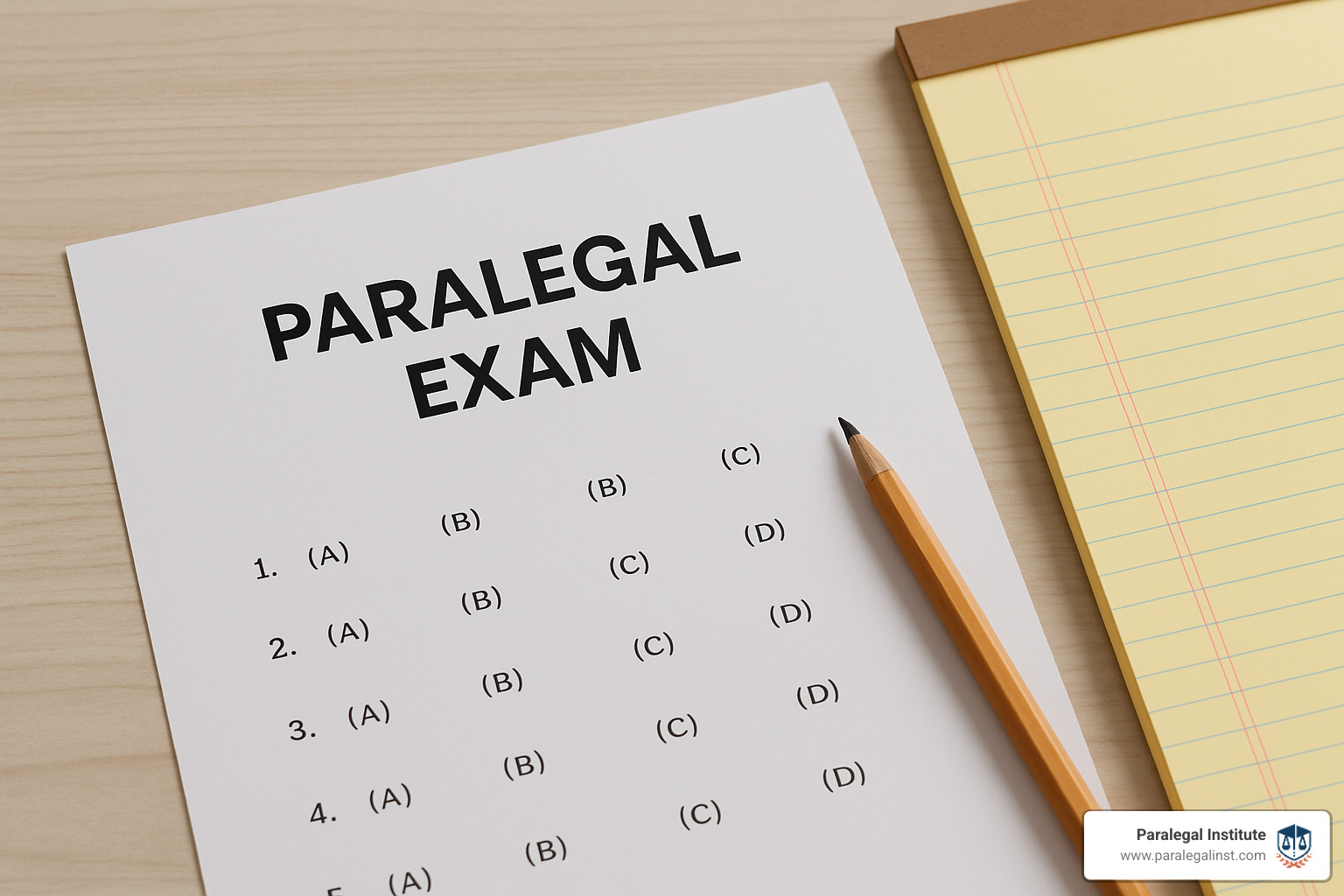
Paralegal Exam Practice Questions for Ethics & Professional Duty
Ethics questions test judgment as much as memory. Example: A new client calls seeking immediate legal advice. The correct response is “I’m a paralegal; I’ll have the attorney call you back.” You’ve identified your role and ensured proper assistance.
Attorney–client privilege protects confidential communications in all legal settings, including mediation.
Paralegals cannot represent clients in court —doing so is unauthorized practice of law.
Keep confidentiality by avoiding discussions in elevators or restaurants. Decline personal gifts or relationships with clients to maintain professional integrity.
The North Carolina State Bar tracks licensed paralegals and handles discipline.
Paralegal Exam Practice Questions on Civil Litigation Skills
Service of process includes the summons, complaint, and civil cover sheet. The defendant’s answer comes later.
Every document filed after the complaint must list the case number and certificate of service to prove delivery.
District or municipal courts usually have original jurisdiction over misdemeanors; felonies begin in higher courts.
When defendants want to sue plaintiffs, they file counterclaims, not cross-claims.
Motions to dismiss challenge legal sufficiency and are not findy tools.
When Shepardizing, the notation “vacated” means a higher court has nullified the decision—no longer good law.
“TM” denotes a claimed trademark before registration, while “®” shows a federally registered mark.
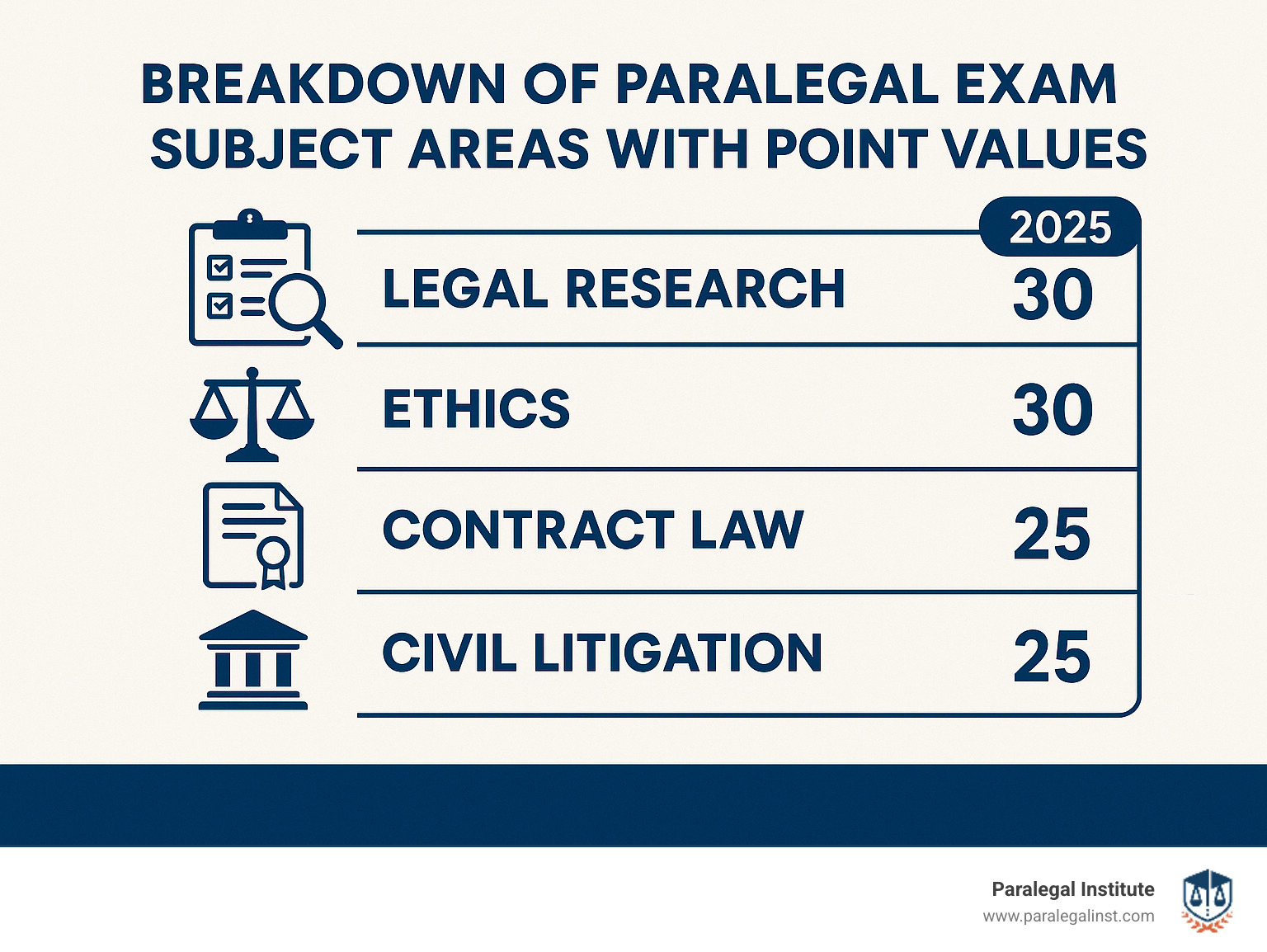
Smart Study Strategies & Common Pitfalls
Highlighting textbooks won’t cut it. Research proves active recall and spaced repetition beat passive reading every time.
- Active recall: Quiz yourself without peeking. Explain concepts aloud as if teaching a friend.
- Spaced repetition: Review new material within 24 hours, then 3 days, a week, and two weeks. Each interval strengthens memory.
- Time boxing: Study in 25-minute bursts with 5-minute breaks; take a longer break every 2 hours to prevent fatigue.
Avoid These Costly Mistakes
- Treating all questions equally. Twenty multiple-choice items are unscored, but you won’t know which—answer everything carefully.
- Ignoring the Skills Test. You must pass both sections; strong multiple-choice skills can’t save a weak memorandum.
- Cramming. Start practicing paralegal exam practice questions at least 8–12 weeks out.
- Poor time management. You get about 90 seconds per multiple-choice question and exactly 2 hours for the memo—practice under timed conditions.
When eliminating wrong answers, watch for absolutes like “always” or “never”—law rarely deals in absolutes.
Scientific research on effective learning techniques
More info about smart study habits
Building Exam-Ready Writing Muscles
The Skills Test memorandum separates the prepared from the panicked. Read the fact pattern twice—first for the big picture, second to mark dates, parties, and potential issues.
Use the IRAC method:
- Issue – What legal question needs answering?
- Rule – Which statutes or cases control?
- Application – Apply the rule to these facts.
- Conclusion – State the likely outcome.
Structure your memo with a header, brief Facts, the Issue, detailed Discussion using IRAC, and a concise Conclusion. Write clearly and proofread.
Start with simple fact patterns, then progress to complex ones—always under a 2-hour clock. Consistent practice builds both speed and confidence.
Resources to Boost Your Score
Finding the right study materials can make or break your paralegal exam practice questions preparation. After helping hundreds of students pass their exams, I've learned that success comes from combining multiple resources rather than relying on just one approach.
Practice test banks form the backbone of effective preparation. You need exposure to hundreds of questions that mirror the actual exam's format and difficulty. The best question banks don't just give you the right answer - they explain why each wrong choice is incorrect.
Look for practice tests that distribute questions across all 10 subject areas in the same proportions as the real exam. Many students make the mistake of focusing only on their strong areas, then struggle with topics they've avoided.
Digital flashcards work wonders for memorizing legal terms, case holdings, and procedural deadlines. The beauty of digital versions is their spaced repetition - difficult cards appear more frequently until you master them. I recommend creating your own cards rather than using pre-made sets.
Comprehensive study guides organize complex legal topics into manageable chunks. The best guides connect theoretical knowledge to practical paralegal tasks. When you're reading about contract formation, for example, a good guide shows you how that knowledge applies when drafting agreements or reviewing client documents.
Mock exam simulations under timed conditions are absolutely essential. You might know the material perfectly, but can you recall it under pressure with a ticking clock? Take at least three full-length practice exams before your test date.
One-on-one tutoring can address specific weak spots that group study might miss. A good tutor provides personalized feedback on your memorandum writing and helps you develop strategies for your particular learning style.
Mobile apps turn dead time into study time. Practice questions during your commute, lunch break, or while waiting for appointments. Look for apps that track your progress across different subjects and adjust difficulty based on your performance.
At the Paralegal Institute, our 15-week program weaves all these resources together into a comprehensive preparation strategy. We've found that students who use multiple study methods consistently outperform those who stick to just one approach.
Free CLA/CP Exam Practice Questions (updated 2025)
More info about skill-building modules
Quick Checklist Before Test Day
The final weeks before your exam can feel overwhelming, but staying organized helps calm those pre-test jitters. Here's your roadmap to test day success.
Two weeks out, confirm your testing appointment and location. Take one final full-length practice exam to gauge your readiness. Focus your remaining study time on your weakest subject areas rather than trying to review everything.
One week before your exam, visit the testing center if you're taking an in-person test. Get familiar with the route, parking situation, and building layout. For remote testing, run a complete technical check of your computer, internet connection, and testing software.
The day before your exam, resist the urge to cram new material. Instead, do a light review of key formulas, deadlines, and procedures. Prepare your testing environment if you're taking the exam remotely. Most importantly, get at least 7-8 hours of sleep.
On test day morning, eat a protein-rich breakfast to maintain steady energy levels. Arrive 15-30 minutes early for in-person testing to allow time for check-in procedures. Bring two forms of valid identification.
For remote testing, ensure your testing area is completely clear of unauthorized materials. Position your camera so the proctor can see your hands and workspace clearly. Test your microphone and speakers one final time.
You've put in the work with those paralegal exam practice questions and study sessions. Trust your preparation and stay calm. Test day is simply your opportunity to show what you've learned.
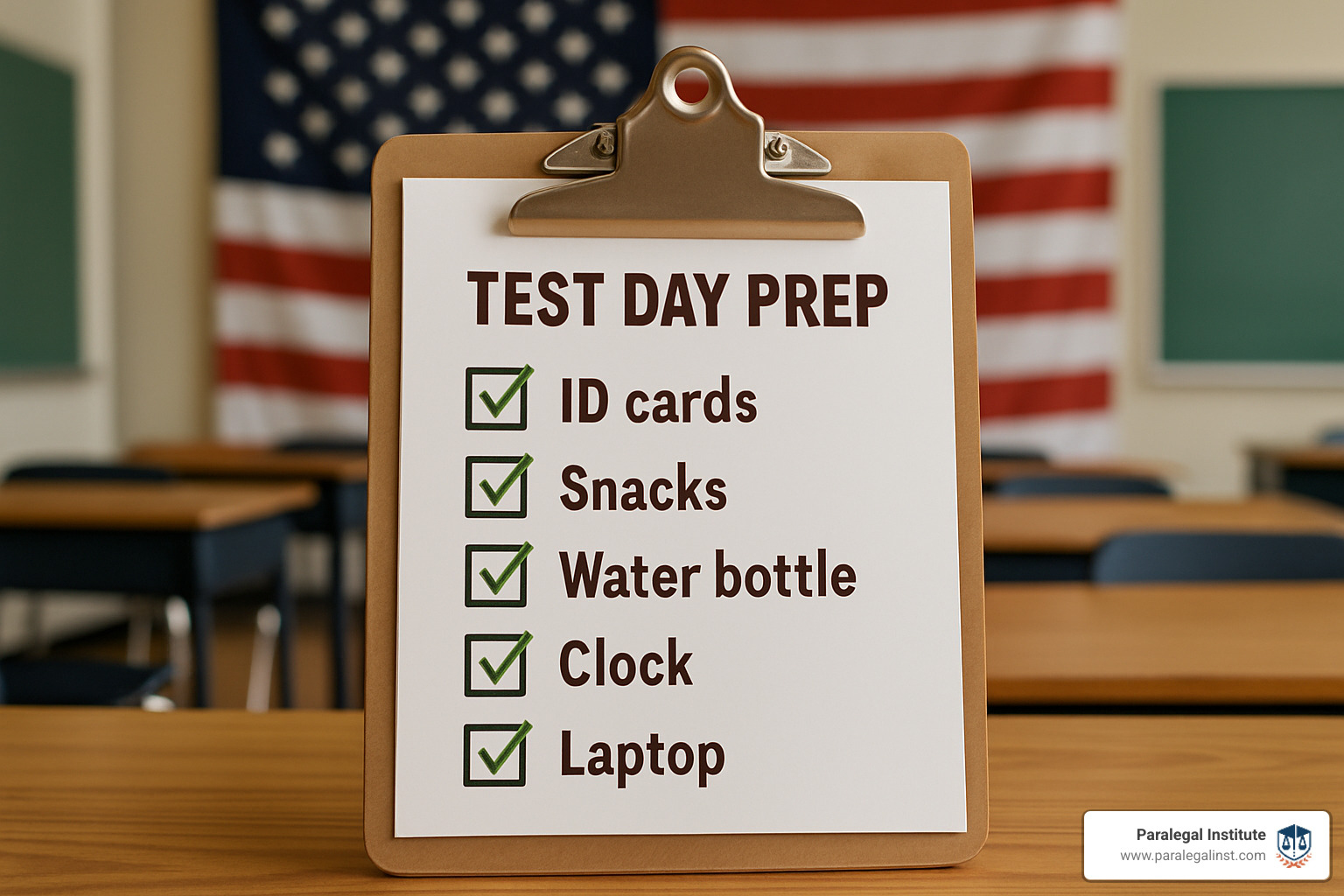
Frequently Asked Questions About Paralegal Exam Practice Questions
Taking the paralegal exam can feel overwhelming, especially when you're not sure what to expect. Let me walk you through the most common questions I hear from students preparing for this important milestone.
How soon can I retake the exam if I don't pass?
If you don't pass on your first attempt, you'll need to wait 90 days before you can retake any failed section. This waiting period applies whether you stumble on the Knowledge Test, the Skills Test, or both parts of the exam.
I know 90 days feels like forever when you're eager to move forward with your career. But this waiting period isn't meant to punish you. It's actually designed to give you enough time to really strengthen your weak areas instead of just hoping for better luck next time.
The good news? Most students who use those 90 days wisely pass on their second attempt. Take time to honestly assess where you struggled. Did you run out of time on the multiple-choice questions? Did the memorandum writing trip you up? Focus your additional study time on those specific challenges.
You'll need to pay the full testing fee again for your retake, so make those three months count. Consider working through more paralegal exam practice questions or getting additional help with legal writing if that's where you struggled.
What's the process for registering and scheduling my paralegal certificate exam?
The registration process is straightforward once you know the steps. Think of it like booking a flight - there are several checkpoints, but each one gets you closer to your destination.
First, you'll need to verify your eligibility. The exam is open to people who meet one of three pathways: completion of a paralegal program, a bachelor's degree plus one year of paralegal experience, or a high school diploma with seven years of paralegal experience.
Next comes the application itself. You'll complete everything online, upload your required documents, and pay your testing fee. Double-check your paperwork before submitting - missing documents can delay the whole process.
Once your application gets approved, you'll receive an Authorization to Test email. This is your golden ticket that allows you to actually schedule your exam date. Don't lose this email - you'll need the information it contains.
The final step involves contacting PSI Services to book your specific testing date and location. You can choose between taking the exam at a testing center or doing it remotely from home. Both options have their advantages, so pick what feels most comfortable for you.
Plan ahead with your timing. The entire process typically takes 2-4 weeks from when you submit your application to when you can actually sit for the exam. Popular testing dates fill up quickly, especially in larger cities.
What's the difference between the Knowledge Test and the Skills Test?
This is probably the most important question to understand, because these two sections test completely different abilities. Think of the Knowledge Test as showing what you know, while the Skills Test proves what you can do with that knowledge.
The Knowledge Test contains 120 multiple-choice questions that you'll need to complete in three hours. It's worth 100 points total, though remember that 20 of those questions are unscored pre-test items. You'll be jumping between 10 different legal subject areas, from civil litigation to contracts to criminal law.
This section tests your ability to quickly recall legal principles and apply them to hypothetical situations. You might see a question about filing deadlines, then immediately switch to a contract formation problem. The challenge isn't just knowing the law - it's switching mental gears rapidly while maintaining accuracy.
The Skills Test takes a completely different approach. You'll have two hours to write one legal memorandum worth 30 points. You'll receive a complex fact pattern that reads like a real case, then analyze the legal issues and write your conclusions in a clear, organized format.
This section separates students who simply memorized rules from those who can think analytically about legal problems. You'll need to spot issues that aren't explicitly stated, apply relevant law to specific facts, and communicate your analysis in writing that a supervising attorney could actually use.
Both sections must be passed to earn your paralegal certificate. You can't compensate for a weak Skills Test score with a strong Knowledge Test performance, or vice versa. That's why effective paralegal exam practice questions should cover both formats extensively.
Conclusion
Your journey to becoming a skilled paralegal starts with mastering paralegal exam practice questions- and the investment you make in preparation today will pay off throughout your entire legal career.
The path ahead might seem challenging with those 120 multiple-choice questions and the memorandum writing test, but thousands of paralegals have walked this road before you. What separates those who pass from those who struggle? Consistent practice with quality exam questions and a strategic approach to preparation.
Think about it this way: every question you practice now is one less surprise on test day. Every memorandum you write builds the analytical muscles you'll use in your first job. When you sit down for that exam, you want it to feel familiar - like meeting an old friend rather than facing a stranger.
The legal field needs paralegals who can think clearly under pressure, spot issues quickly, and communicate effectively. These aren't just exam skills - they're the foundation of everything you'll do as a professional. The paralegal exam practice questions you work through today are training you for real cases, real clients, and real deadlines.
Starting your preparation 8-12 weeks before test day gives you time to build confidence gradually rather than cramming frantically. Using active recall and spaced repetition means the knowledge sticks when you need it most. Taking full-length practice exams under timed conditions prepares you for the mental stamina required on the actual day.
But here's what really matters: this exam is just the beginning. Your paralegal certificate opens doors to meaningful work in law firms, corporate legal departments, and government agencies. You'll be part of a profession where job growth continues strong and where your skills make a real difference in people's lives.
At the Paralegal Institute, we've watched hundreds of students transform from nervous test-takers into confident legal professionals. Our 15-week program doesn't just prepare you for the exam - it prepares you for success in your first paralegal position. We combine comprehensive test preparation with practical skills training because we know both matter for your career.
The curriculum we've developed comes from real legal experience, not textbook theory. Our instructors understand exactly what you'll face on test day and what employers expect from new paralegals. Whether you choose our online or in-person options, you'll get the support and guidance that makes the difference between passing and excelling.
Your future starts with that first practice question you answer today. Every legal concept you master, every memorandum you write, every timed practice test you complete - they're all building toward the moment when you walk out of that testing center knowing you've succeeded.
The legal profession is waiting for dedicated paralegals like you. With focused preparation, strategic practice, and the right support, you'll not only pass this exam - you'll launch a rewarding career that challenges and fulfills you for years to come.



